Noun DefinitionWe encounter many living and non-living things in our daily lives, and we all call them by some name, and those names are known as nouns. In other words, everything or everyone that is connected to our sensory receptors is referred to as a Noun. It might be a particular thing or group of things, such as living things, locations, traits, states of being, or beliefs. In general, a noun is a naming word. 
Noun DefinitionNouns can name individuals, groups, geographic locations, species of animals, things, and concepts. A noun appears in almost every phrase, and they serve a variety of functions. Nouns have several roles that they can play, including subject, indirect object, direct object, subject complement, and object complement. A noun may also serve as an adjective or a verb. Examples of Nouns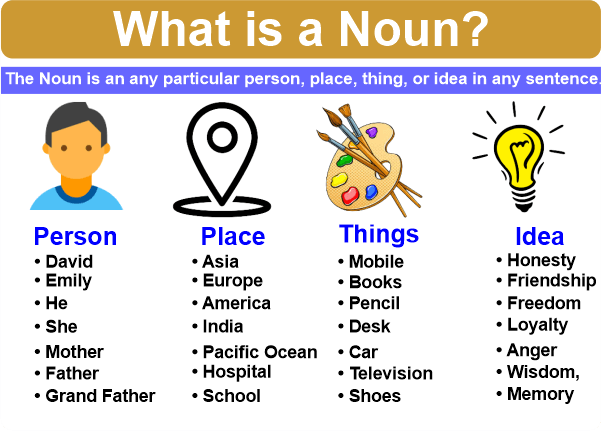
People: Priyank, Ashu, Anshul, Man, Person, Women, the Prime Minister Places: India, Mexico, Orissa, Belgium, The Nile River, Classroom, Basketball Court, Ground, Swimming Pool Animals/Birds/Aquatic Animals/Reptiles: Lion, Giraffe, Ostrich, Dolphin, Zebra, Alligator, Bear, Fish, Shark Ideas: Invention, Extinction, Endanger, Innovation, Argument, Destruction Objects/Things: Bat, Cycle, Pen, Paper, Bag, Blackboard, Mug Types of Nouns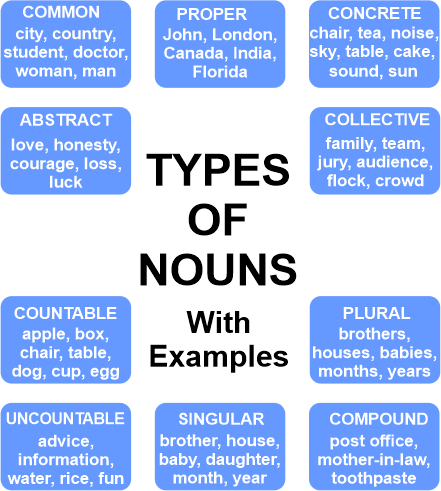
1) Common Nouns: Common nouns designate ambiguous or general individuals, locations, or objects. For example, "nation" is a common noun that denotes a general location, but the phrase "London" denotes a particular location. Common nouns are capitalized when they come before other words or are part of names or titles, such as Grand Canyon or Wonder Woman. 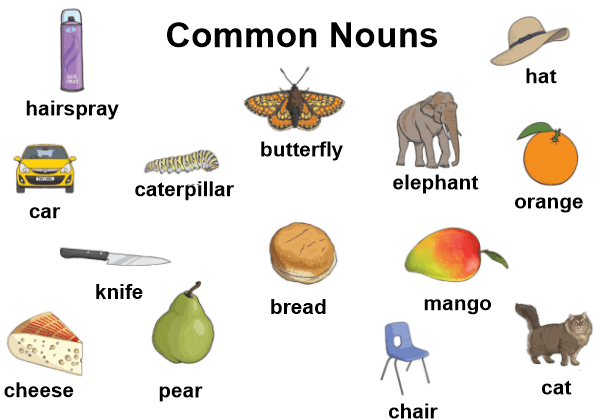
Example: nation, water, teacher, boy 2) Proper Nouns: Proper nouns assist in identifying a particular person, place, or item. It would help if you capitalized these words. Proper nouns are usually used in names and titles, such as the company name Lakme and the individual name Jenny. 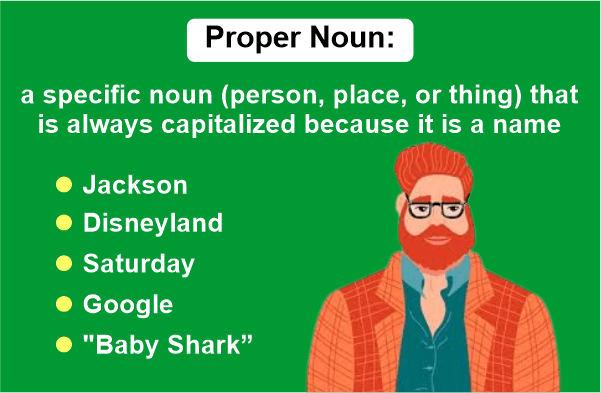
Example: Paris, Sahil, India, London 3) Singular Nouns: A singular noun refers to one person, location, or item. For example, a dog is one animal, and a carrot is one vegetable. 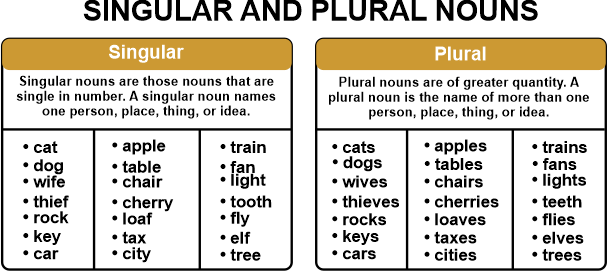
Example: boy, child, desk, cup, woman 4) Plural Nouns: A plural noun denotes more than one of anything. Numerous singular nouns may be plural by simply adding an S at the end (e.g., dogs become dogs). You may have to add -es to the end of some nouns to produce their plural forms even though they already finish in an s (e.g., bushes and patches). When becoming plural, several singular nouns also undergo spelling changes (e.g., flies and countries). 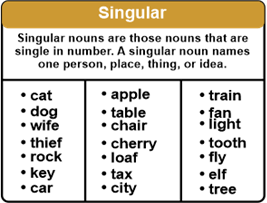
Example (Regular plural nouns): boys, elephants, and nations.
Example (Irregular plural nouns): woman and women, child and children, wolf and wolves, life and lives, foot and feet, person and people, tooth and teeth 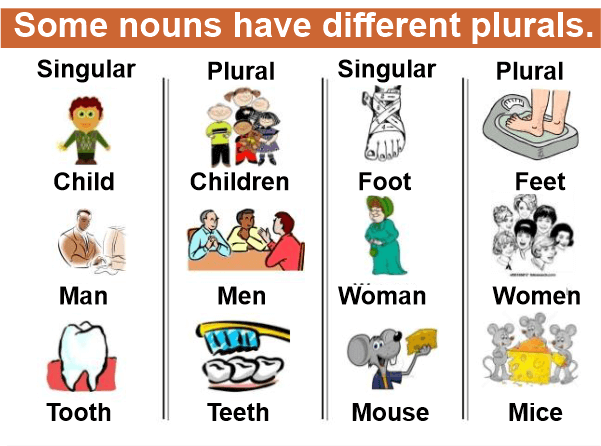
5) Concrete Nouns: Something perceivable using all five senses is a concrete noun. A concrete noun is used when something can be seen, heard, touched, tasted, or odored. 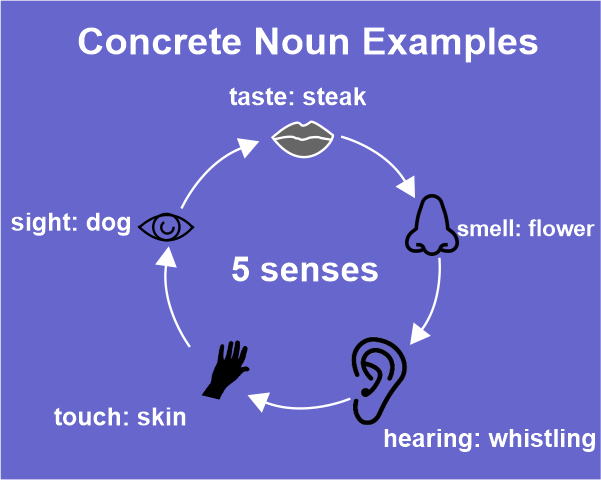
Example: flower, music, milk, team, stars 6) Abstract Nouns: Abstract nouns, such as social notions, political ideologies, and personality qualities, are intangible concepts that the five senses cannot sense. For example, the abstract term happiness denotes an emotion, but the abstract term courage denotes a personal trait. 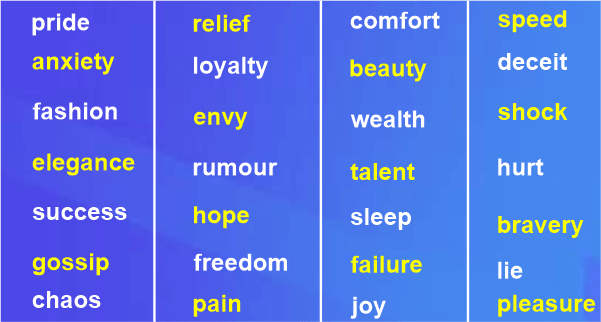
Examples: fear, honesty, love, creativity, beauty 7) Collective Nouns: A collective noun is a word that refers to a group of individuals or objects while also acting as a singular noun. A group that operates as a single entity or simultaneously carries out the same action is referred to by a collective noun. 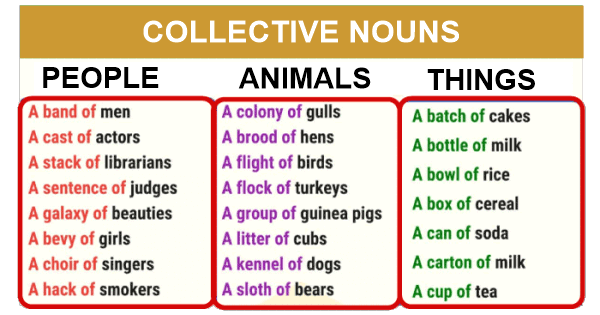
Example: a bunch of grapes, deck of cards, crowd, committee 8) Compound Nouns: A compound noun is a noun formed from two or more words. Compound nouns can have the form of one word, many words used independently, or words joined together by hyphens. 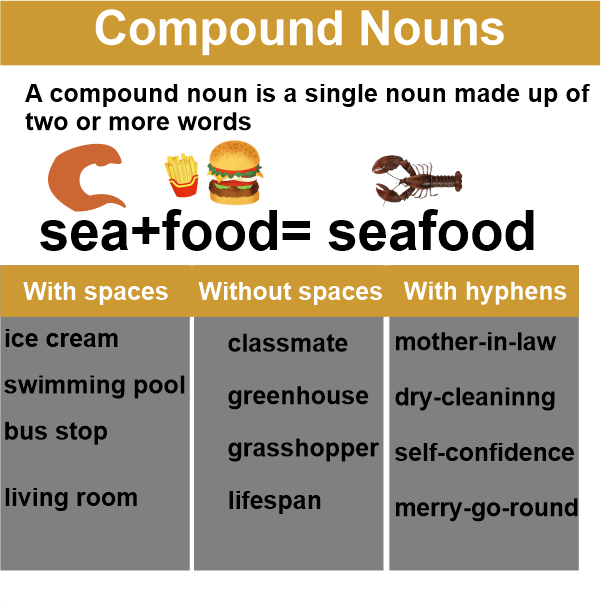
Example: dining-table, mother-in-law, cardboard, toothbrush, hairpin, ice cream 9) Countable Nouns: A countable noun is one you can count, commonly referred to as a count noun. You discuss a countable noun if you have three textbooks or ten chocolate bars. 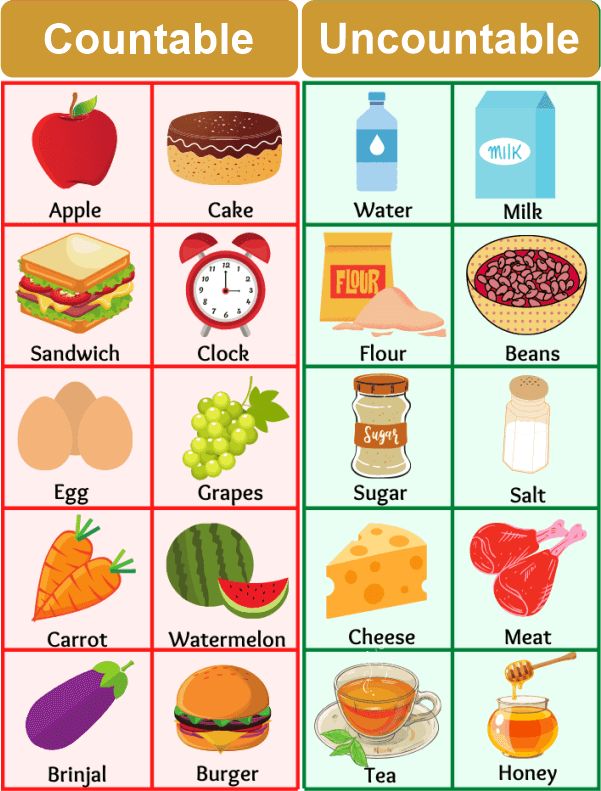
Example: table, chair, plate, animal, bird 10) Uncountable Nouns: A noun that cannot be numbered is an uncountable noun or a mass noun. For example, joy cannot be measured numerically, and Plural forms are frequently absent from uncountable nouns. 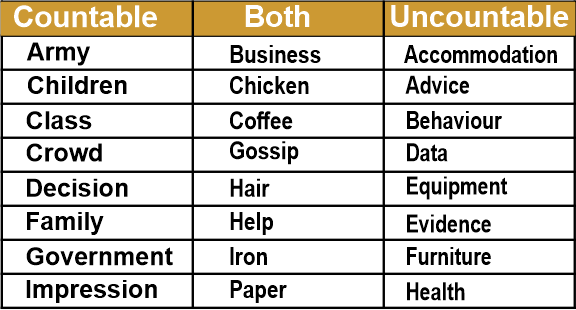
Example: advice, sugar, air, water, knowledge Different Nouns Used in a Sentence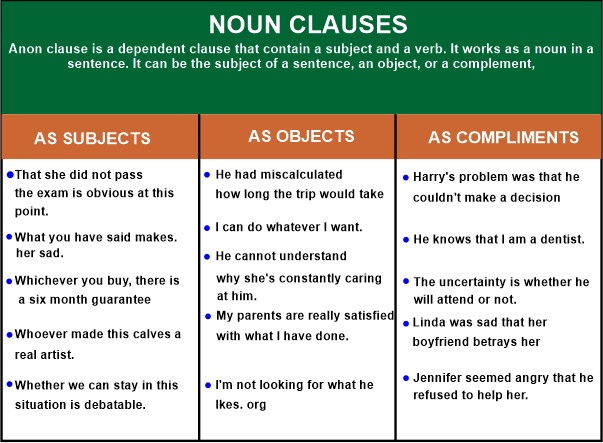
Use of Nouns as SubjectsA noun often occurs at the start of a sentence when it is employed as the subject. It may be located by asking "who," as in who it is. Example:
Use of Nouns as ObjectsNouns are usually used as objects in a sentence's last clause-the word "what" can be used to pinpoint it. Example:
Note: Nouns can function as both direct and indirect objectsNouns Used as Direct ObjectsAsking "what" will reveal a noun used as a direct object. Example:
Use of Nouns as Indirect ObjectsTo determine a noun used as an indirect object, you might utilize the "for whom" question. Example:
Note: A noun serves as a compliment when it describes or modifies another noun.Nouns Used as Subject ComplementPositions and professions can serve as a subject complement. Example:
Nouns Used as Object ComplementAfter the noun change, object complements are nouns. Names, occupations, and positions may serve as an object complement. Example:
Multipurpose NounsUse of Nouns as VerbsSome nouns can also function as verbs. Several nouns can also be employed as verbs with a little alteration in the original word's spelling. 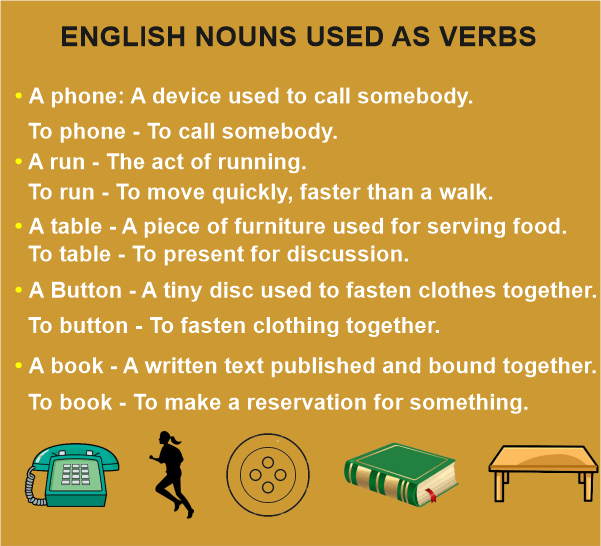
Example:
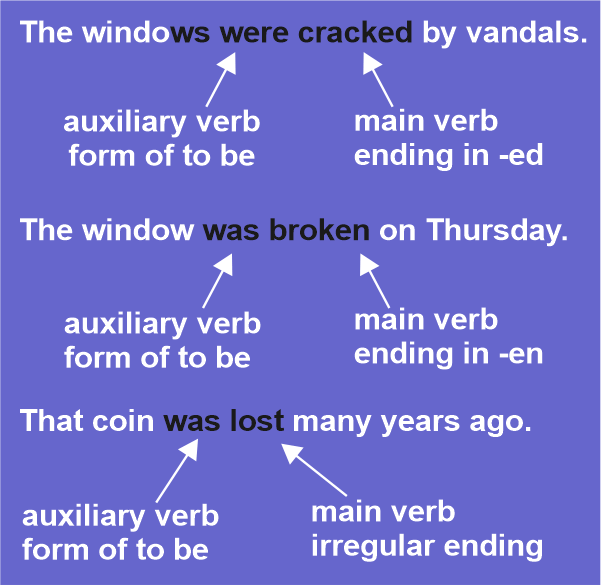
Using Nouns as AdjectivesNouns can occasionally be treated as adjectives by putting a suffix to the base word or changing the spelling slightly. 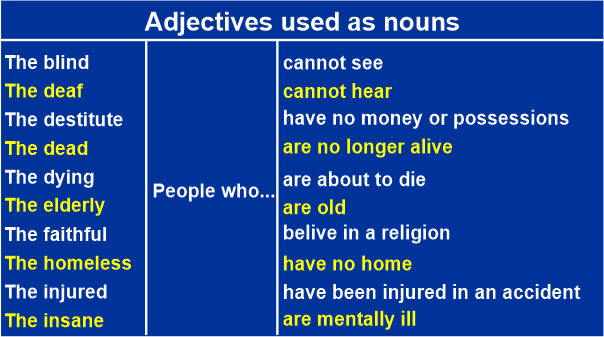
Example:
Other Types of NounsEnglish has more nouns than any other language, and several methods exist to create and use them. Different significant noun categories include: 1) Possessive nouns: To denote possession, a noun is joined by an apostrophe (') and the letter "s" (e.g., "my father's house"). The apostrophe should be used after the last "s" of a plural noun to denote possession (for example, "my parents' house"). Example: This location is larger than my sister's flat but smaller than my parents' home. 2) Gerunds: A gerund is a word that has the same meaning as a verb's present participle (the "-ing" form). For example, the noun "driving" was created from the present participle of the verb "drive," Both words describe the same activity. 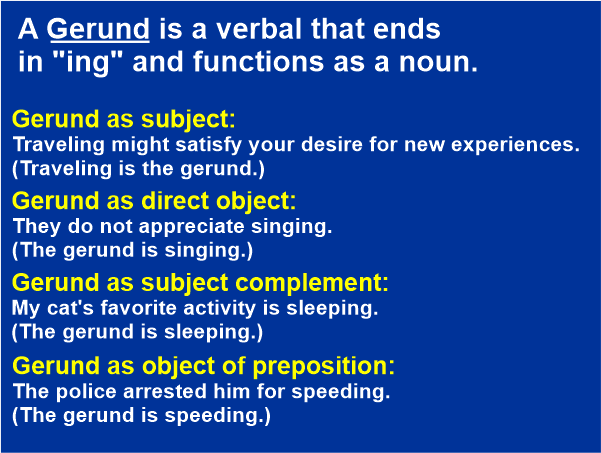
Example: My favourite pastimes while on vacation are reading and sunbathing. 3) Attributive Nouns: A noun can be modified by an attribute noun, which functions similarly to an adjective. For example, "company," which appears in the phrase "company policy," is an attributive word. Even though they function similarly to adjectives, attributive nouns are nonetheless considered nouns. This is because they fall short of every adjective's grammatical criteria. For example, they must come before the noun; otherwise, it would be confusing to say, "a policy that's a company." Example: Though I love carrot cake, ice cream is my preferred dessert. 4) Appositive Nouns: A noun that follows another noun to provide more information is appositive. Without the appositive, it wouldn't be evident to whom or what you are addressing. Therefore, it is written without any additional punctuation. If it adds extra details that are not necessary, it is enclosed in commas. Example:
5) Generic Nouns: A generic noun is employed to designate an entire class of objects. They can be singular or plural and have no article, an indefinite article, or both. In certain instances, a noun can be used broadly, while not in others. Example:
Rule of NounsThere are ten noun rules in all, which are covered in the section below. Rule 1: Although certain nouns have plural meanings, they are usually treated as plural verbs, and some nouns have singular meanings but are utilized as plural nouns. People, the government, the public, men, and women are a few examples. Example: The cops are performing well. 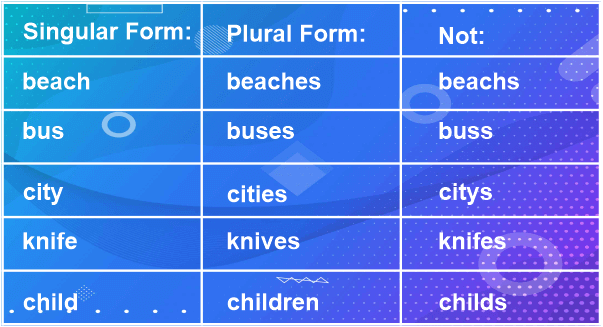
Rule 2: Some nouns usually take plural verbs and are employed in plural form in sentences or phrases. For instance, pants, buses, taxes, etc. Example: Is the pair of glasses he purchases from the store fashionable? Rule 3: Always use a noun to denote a quantity, weight, length, amount of money, etc. When a certain number came before this term, it didn't alter. Example:
Rule 4: Certain nouns, such as furniture, ethics, guidance, arithmetic, and information, always accept singular verbs Example:
Rule 5: Collective nouns must always be utilized in both plural & single forms. A jury, the general public, the government, a committee, an orchestra, etc. Example:
Rule 6: Material nouns are not preceded by the articles a, an, or the. Example:
My sister prefers silver over gold. (Correct) Rule 7: Some nouns have a distinct meaning when used in the plural and a different meaning when used in the single. For example, "work" includes both "job tasks" and "compositions." Example: He has already consumed one-fourth of the pizza. 
Rule 8: We must utilize the feminine gender to represent elegance and beauty, whereas power and strength for the masculine gender to manifest the Neuter gender noun. Example: The stars were blazing brightly on the ocean floor. Rule 9: Even when collective nouns are applied to refer to living things, the neuter gender is employed. Example:
The neuter gender is used for small creatures, young children, or insects.
Rule 10: Even though a title for a book, piece of art, etc., seems plural, it is still always assumed to be singular. Example: My favourite movie is The Gangs of Wasseypur.
Next TopicpH Definition
|
 For Videos Join Our Youtube Channel: Join Now
For Videos Join Our Youtube Channel: Join Now
Feedback
- Send your Feedback to [email protected]
Help Others, Please Share










